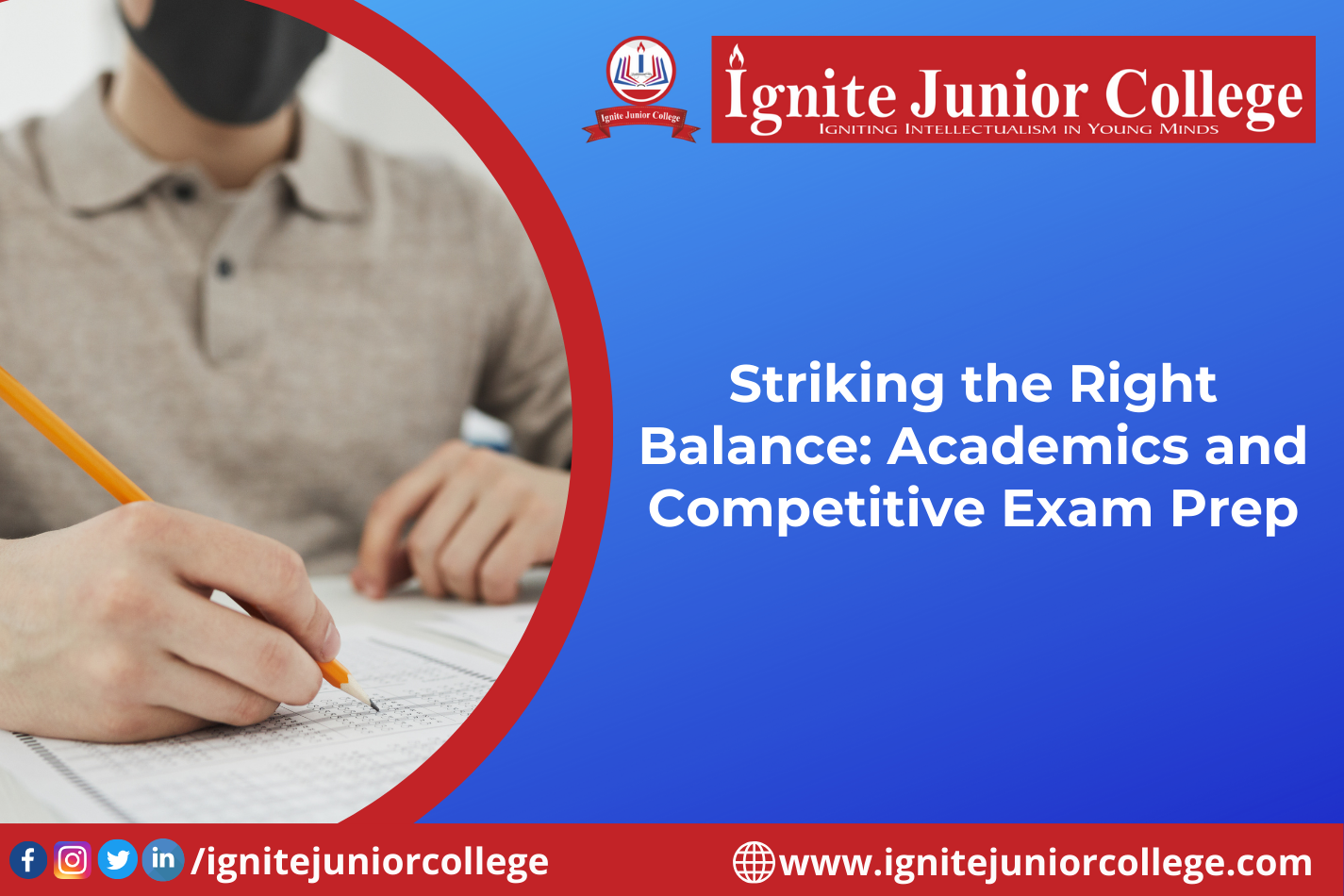Introduction
Balancing academics and competitive exam preparation often feels like walking on a tightrope. One wrong step, and either academics or exam prep suffers. Many students struggle to manage both effectively, leading to stress, burnout, or lack of clarity in their goals. But at Ignite Junior College, the focus is not just on studying harder, but smarter. The institution emphasizes a holistic approach where classroom learning and exam preparation go hand in hand, ensuring students stay ahead without compromising their mental well-being.
Think of it like learning to ride a bicycle—one wheel represents academics, the other represents competitive exams. To move forward smoothly, both wheels must be in balance.
This article explores how Ignite Junior College creates this balance and why it matters for a student’s overall growth.
1. Understanding the Challenge: Academics vs. Competitive Exams
Students in junior college face dual responsibilities—performing well in board exams while also preparing for competitive exams like JEE, NEET, or CLAT. Each requires a different learning strategy. Academics often focus on concept clarity and prescribed curriculum, while competitive exams demand problem-solving, speed, and application skills.
The challenge lies in giving both the right amount of attention without letting one overshadow the other.
2. Why Balance Matters for Students
Why is balance so important? Without it, students may:
- Excel in exams but underperform academically.
- Score high in academics but miss out on competitive opportunities.
- Experience stress, anxiety, or lack of motivation.
A well-structured balance ensures that students:
- Build a solid foundation of knowledge.
- Stay mentally healthy.
- Are future-ready for college admissions and beyond.
3. Ignite Junior College’s Unique Academic Approach
Ignite Junior College adopts an integrated learning model where the curriculum supports both academic progress and exam readiness. Instead of treating them as separate, the institution blends the two seamlessly.
For example, topics covered in the academic syllabus are linked with competitive exam-style questions. This not only saves time but reinforces learning from multiple perspectives.
4. The Role of Curriculum Design in Achieving Balance
A well-planned curriculum is like a roadmap—it guides students without overwhelming them. Ignite Junior College ensures:
- Even distribution of topics to avoid last-minute rush.
- Interlinked chapters that cover board exam requirements and competitive exam standards simultaneously.
- Regular checkpoints to measure progress in both streams.
5. Time Management: The Key to Success
Time management is not about studying 12 hours straight—it’s about studying smartly. Ignite trains students to:
- Use daily planners to allocate time for academics and exam prep.
- Break large topics into smaller, manageable chunks.
- Practice Pomodoro techniques for better focus.
6. Building Discipline Without Stress
Discipline often gets confused with rigidity. At Ignite, discipline is encouraged through consistent study patterns, not harsh restrictions. Students learn to:
- Stick to a routine.
- Balance study time with breaks.
- Avoid procrastination with guided schedules.
7. Faculty Support: Mentorship Beyond Teaching
Teachers at Ignite are more than instructors—they are mentors and guides. Faculty members:
- Provide one-on-one mentoring sessions.
- Track individual progress.
- Offer personalized strategies for students struggling with balance.
8. Integrated Learning: Merging Theory with Practice
Instead of memorizing concepts, students apply them in practical, exam-style scenarios. For instance:
- Physics equations are tested with real-life problem-solving.
- Math concepts are reinforced with speed-based problem sheets.
- Biology concepts are connected to NEET-style questions.
9. The Importance of Revision and Regular Assessments
At Ignite, revision is not left for the last minute. Students follow:
- Weekly tests for retention.
- Mock exams simulating real exam conditions.
- Feedback sessions to identify weak areas early.
This makes exams less stressful and more predictable.
10. Technology as a Learning Partner
In today’s world, technology is not a distraction but a study partner. Ignite uses:
- Smart classrooms for interactive lessons.
- Online practice portals for mock exams.
- Performance dashboards for tracking progress.
11. Extracurricular Activities: Why They Matter
All work and no play makes students burn out quickly. Ignite encourages:
- Sports and cultural events.
- Hobby clubs (debate, arts, music).
- Fitness routines for physical health.
These activities refresh the mind and boost confidence.
12. Stress Management and Mental Well-being
Competitive pressure can affect mental health. Ignite provides:
- Counseling sessions for students.
- Mindfulness practices like meditation and yoga.
- Workshops on handling exam stress.
13. Peer Learning and Group Study Benefits
Studying together can be more productive than studying alone. Ignite promotes:
- Group study circles for better doubt clarification.
- Peer teaching methods where students explain topics to each other.
- Healthy competition to keep motivation high.
14. Parental Involvement in Student Success
Parents play a huge role in creating balance. Ignite involves parents through:
- Regular progress reports.
- Parent-teacher meetings to align goals.
- Guidance on supporting children emotionally.
15. Preparing for the Future: Life Skills Beyond Exams
Academics and exams are important, but so are life skills. Ignite helps students develop:
- Critical thinking.
- Communication skills.
- Decision-making abilities.
These skills ensure success beyond classrooms and exam halls.
16. Conclusion: Walking the Path of Balance
Striking the right balance between academics and competitive exam preparation is not easy, but it is achievable with the right guidance. Ignite Junior College proves that with structured learning, mentorship, and holistic growth opportunities, students don’t have to choose between the two—they can excel in both.
FAQs
1. How does Ignite Junior College help students balance academics and competitive exams?
By offering an integrated curriculum, personalized mentorship, and regular assessments that cover both areas.
2. Is it possible to excel in both board exams and competitive exams?
Yes, with proper time management, structured learning, and consistent revision, students can excel in both.
3. Do extracurricular activities affect exam preparation negatively?
No, they actually help reduce stress and improve focus, making students more productive.
4. How important is parental involvement in maintaining balance?
Very important. Parents provide emotional support, encouragement, and help monitor progress.
5. Can stress from competitive exams affect academic performance?
Yes, unmanaged stress can harm performance. That’s why Ignite focuses on counseling, mindfulness, and stress management.



